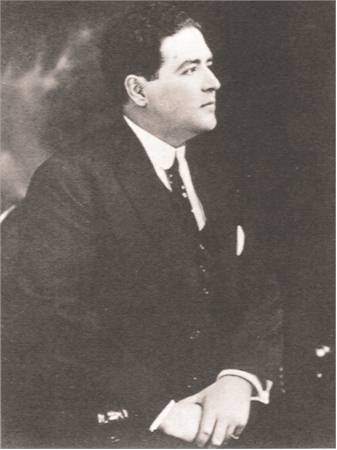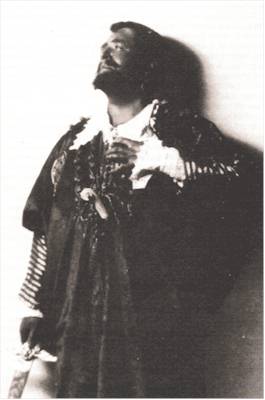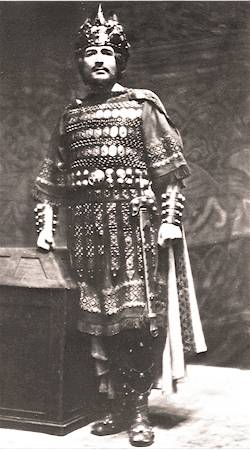Chilean baritone and tenor, 1892 - 1935
Biographical notes (by Juan Dzazopulos Elgueta):
Renato Zanelli, nom d'art of Renato Zanelli Morales, was born in Valparaíso (Chile) on April 1st, 1892 . His father was Italian and his mother Chilean. In 1894 he was taken to Europe and was
educated in Switzerland and Italy. He returned to Chile in 1911 to work in his father's salpeter factory office in Valparaiso. His voice was discovered at a social party by Angelo Querzé, an
Italian tenor who had sung in Chile in 1894 in the local premiere of "Otello". Zanelli studied with Querzé for three years and made his debut as baritone, in September 1916, as Valentine in
Gounod's "Faust". Next year he sang in Montevideo (Uruguay) the roles of Tonio and De Luna and repeated them in Santiago in September 1917. Next year he travelled to New York where he met
Andrés Perelló de Segurola, the famous Spanish bass who was also a friend of his teacher Querzé. Segurola organized a concert tour for the young man and introduced him to the
Metropolitan Opera General Manager, Giulio Gatti-Casazza. The audition was so successful that Zanelli was engaged on the spot as first baritone. He was only 27 years old and the other
baritones in the Company included Amato, De Luca and Scotti. A week after he signed a contract with the Victor Talking Machine Co. to make 20 records. Renato Zanelli made his debut at the
MET on November 19, 1919 as Amonasro in "Aida" with Claudia Muzio, Gabriella Besanzoni and Giovanni Martinelli. He sang until 1923 with the Company with such a famous colleage as Enrico
Caruso, in "Pagliacci" and "Forza del Destino". Other operas at the MET were Trovatore, Le Coq
d'Or , and Faust. In other cities he sang "La Damnation de Faust", "Carmen", "Lucia", "Rigoletto",
"La Gioconda" and "La Traviata". He sang with the Scotti Opera Company and at the Ravinia Park, in Chicago. In addition to staged operas he made several tours from coast to coast. His last
appearance as baritone was at the Central Park in New York in an open air recital with excerpts of "Otello" as Iago to the famous Otello of the Porto Rican tenor Antonio Paoli. Not sattisfied
with the opportunities the MET was given to him he left for Italy and changed his register to tenor, studying with the famous teachers, Lari and Tanara.
His debut as a tenor was in October 28, 1924 as Alfredo in "La Traviata" at the Politeama Giacosa, in Naples. In November that year he also sang there the role of Raoul in "Gli Ugonotti".
Next year, 1925, he added to his repertory the operas "La Fanciulla del West", "Il Trovatore",
"Tosca" and "Norma". His first "Otello" was on November 3, 1925 at the Politeama Chiarella in Turin. In 1926 he sang in Buenos Aires and Rio de Janeiro, adding the roles of Canio in
"Pagliacci" and "Nerone" (Boito ) , later that year he sang at the Teatro Dal Verme in Milan,
"Lohengrin" and "Mefistofele". In 1927 in Egypt he sang "Otello", "L'Africana" and
"Mefistofele". At that point of his career, he was considerated the best "Otello" and his contracts forced him to sing that role in almost every theater of importance. In 1928 he scored a
great success as the Moor, at the Covent Garden and came back to Chile as a famous singer. At the Municipal he sang Lohengrin, Pagliacci, Carmen, Otello and the first performance in Chile of
"Tristano e Isotta", that was also the first time Zanelli sang that role. In the season 1929/1930
he sang at the Reale dell'Opera, in Rome, "La Walkiria", "La Forza del Destino", "Tristano e
Isotta" and the world premiere of "Lo Straniero" by Ildebrando Pizzetti. In June 1930 he sang again "Otello" at the Covent Garden and in December 1930 Zanelli sang for the first time at La
Scala in Milan, in the operas "Tristano e Isotta" and "Lo Straniero" (also a local premiere). In
1931 he returned to La Scala to sing "La Rosa di Saron" by Adriano Lualdi. Though he never sang his famous Otello at La Scala, he sang it at the Teatro Dal Verme in Milan, in September 1931. His
Iago on that occasion was his brother, CARLO MORELLI ! In 1932 he sang at La Scala and in Rome again "Tristano" and “Walkiria” at the Regio, in Parma. In May 1933 he returned to South
America to sing at the Teatro Colón in "Debora e Jaele" by Pizzetti and "Norma". He crossed the Andes to visit his home country and sang at the Municipal Andrea Chénier, Tosca, Trovatore,
Pagliacci, Mefistofele and Aida. In October 12 and 15, 1933, Renato Zanelli sang in Santiago, the last Otellos of his life. His last appearance as a singer was in a concert , in the city of Osorno in
October 25, 1933. In February 1934 Zanelli returned to U.S.A. where he was engaged to sing in opera and concerts. However, his advanced illness prevented him from fulfilling most of his
engagements. It is said that he sang on radio and gave a few concerts. However, I have found no evidence to support this. Zanelli consulted several doctors and cancer at the kidneys was
diagnosed. He returned to Chile and on March 25, 1935, he underwent an operation but his weakened condition could not stand it and he died, one week before his 43rd birthday.
“Tamagno’s true successor of Otello”
As Tristan Comment: Like Vinay, Melchior and Domingo, Zanelli began his career as a baritone. We are lucky to
possess some great recordings of this earlier period. Additionally, there are his famous excerpts from Otello. What a pity that there are no Wagner recordings!
Herman Klein wrote: “Zanelli’s performance is masterly in the extreme. He sings the music with a wonderful command of color and feeling, and he is an actor of the very highest order.”
Another tribute came from Richard Capell: “The dramatic vividness of Zanelli’s Otello was something rarely seen on the operatic stage. He held the eye, he held one’s sympathies. This
Otello, one knew, was truly commander, a man out of the ordinary; his movements spoke of active blood and a proud mind. The greatest heroic rang may not be in Zanelli’s voice, yet this true artist
made his veiled, compressed, cello-like tone seem characteristic of Otello’s nature. Yes, a great Otello, worthy of the wonderful part, the hardest and the grandest in all opera.”
Zanelli had a warm, full-bodied and baritonal voice, singing with exceptional legato. I particularly like his version of A tanto amor, but also is superb in arias from Zazà, La Wally and
Rigoletto. The Spanish songs are performed in a truly enchanting manner. At the beginning of his career, his voice was unquestionably a baritone and “matured” to a
dramatic tenor. Otello was to be his his trade mark in later years, and the recordings of the role are in a class of its own. His Otello is a tragedian of high distinction, always displayed with a sense of musical line.
My warmest thanks to Juan Dzazopulos Elgueta
|
||||||||||||||||


